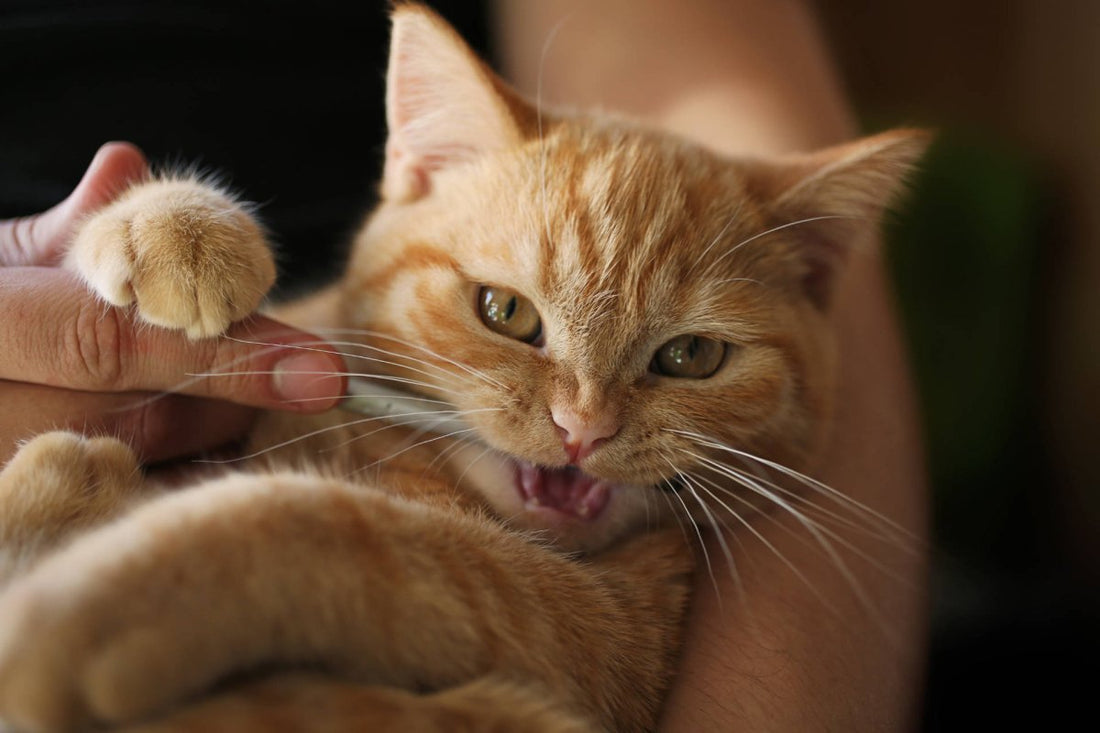Dental care for cats: Because healthy teeth don’t just look pretty
Dental care for cats – is it really necessary? The short answer: Yes! Healthy teeth and a strong bite are not only important for your cat's nutritional intake, but also for their overall health. Dental problems such as tartar or inflammation can quickly lead to serious illnesses. But don't worry: With proper care and a few simple tricks, you can keep your cat's teeth healthy for a long time. In this blog, you'll learn why dental care is so important, how to recognize dental problems, and which natural methods are particularly effective.
Why is dental care so important for cats?
Your cat's teeth play a pivotal role in their health. They not only serve as a food source, but are also crucial for fighting off pathogens. Neglected dental care can lead to serious problems.
What happens if you don’t take good care of your teeth?
- Tartar formation: Hardened plaque that can lead to inflammation.
- Gingivitis: Inflammation of the gums, often painful.
- Tooth loss: Untreated dental problems can result in tooth loss.
- Systemic diseases: Bacteria from the mouth can enter the bloodstream and damage organs.
Signs of dental problems in cats
Cats often show symptoms of dental problems late in life, so it's important to know the signs and check for them regularly.
Typical symptoms:
- Bad breath: A first warning sign of dental problems.
- Loss of appetite: Pain while eating can cause your cat to eat less.
- Bleeding gums: An indication of gingivitis.
- Tooth discoloration: Yellowish or brown deposits indicate tartar.
- Behavioral changes: Irritability or withdrawal may indicate pain.
If you notice any of these signs, you should consult your veterinarian.
How does dental care work for cats?
Dental care for cats is easier than you might think. With the right technique and the right tools, you can maintain your cat's dental health.
1. Brush your teeth regularly
- Use special toothbrushes and toothpastes for cats.
- Start slowly so your cat gets used to the procedure.
- Brush your teeth 2-3 times a week.
2. Dental care products
- Dental care treats: Support the cleaning of teeth.
- Tooth cleaning gels: Reduce plaque and tartar.
- Chew toys: Promotes mechanical cleaning of the teeth.
3. Natural dental care
- Coconut oil: Has antibacterial properties and can be applied to the teeth.
- Raw meat: Promotes mechanical cleaning through chewing.
Natural dental care for cats: Effective and gentle
If you are looking for a gentle way to care for your cat's teeth, natural approaches are a good option.
Tips for natural dental care:
- Raw meat diet: Bones and raw meat promote dental health through mechanical cleaning.
- Dental care herbs: Parsley or mint can help reduce bad breath.
- Coconut oil: A small amount applied to the teeth can reduce bacteria.
Natural methods are a good complement, but do not replace regular brushing.
How does the veterinarian recognize dental problems?
The veterinarian can detect and treat dental problems early, so regular checkups are important.
Examination methods:
- Clinical examination: Visual inspection of teeth and gums.
- X-rays: Show hidden problems such as root canal disease.
- Professional teeth cleaning: Removes stubborn tartar.
How often should you have your cat's teeth checked?
It is recommended that you have your cat's teeth checked by a veterinarian at least once a year. More frequent checkups may be beneficial for older cats or those with dental problems.
Common dental problems in cats
Cats can suffer from various dental problems, which often show similar symptoms.
1. Tartar
- Hard deposits that can lead to inflammation.
- Treatment: Professional teeth cleaning.
2. Gingivitis
- Inflammation of the gums, usually caused by bacteria.
- Treatment: cleansing and drug therapy.
3. FORL (Feline Odontoclastic Resorptive Lesions)
- Painful dental disease in which teeth dissolve.
- Treatment: Extraction of the affected teeth.
Prevention: How to keep your cat's teeth healthy
Prevention is the best way to avoid dental problems. With these tips, you can ensure your cat's long-term dental health.
1. Brush your teeth regularly
- Introduce your cat to dental care early.
2. High-quality nutrition
- Avoid sugary treats and rely on dental care products.
3. Tooth-friendly toys
- Toys that encourage chewing help clean teeth.
4. Regular checks
- Have your cat's teeth checked by a veterinarian once a year.
Frequently asked questions about dental care for cats
“Can I clean my cat’s teeth myself?”
Yes, with special toothbrushes and toothpastes this is easily possible.
“How often should I brush my cat’s teeth?”
Ideally 2-3 times a week.
“Does my cat need a professional teeth cleaning?”
In case of severe tartar or inflammation, professional cleaning is necessary.
“Is dental care just as important for indoor cats?”
Yes, even indoor cats can develop dental problems.
Conclusion: Dental care for cats – little effort, big effect
Dental care for cats is an important part of their preventative health. With regular care and proper nutrition, you can prevent dental problems and give your cat a healthy, happy life. The most important points at a glance:
- Symptoms: Bad breath, bleeding gums and loss of appetite are warning signs.
- Treatment: Brushing teeth, natural dental care and veterinary check-up.
- Prevention: Regular care and high-quality nutrition are key.
With a little practice and patience, dental care will become routine for your cat – and healthy teeth will thank you and your furry friend!



